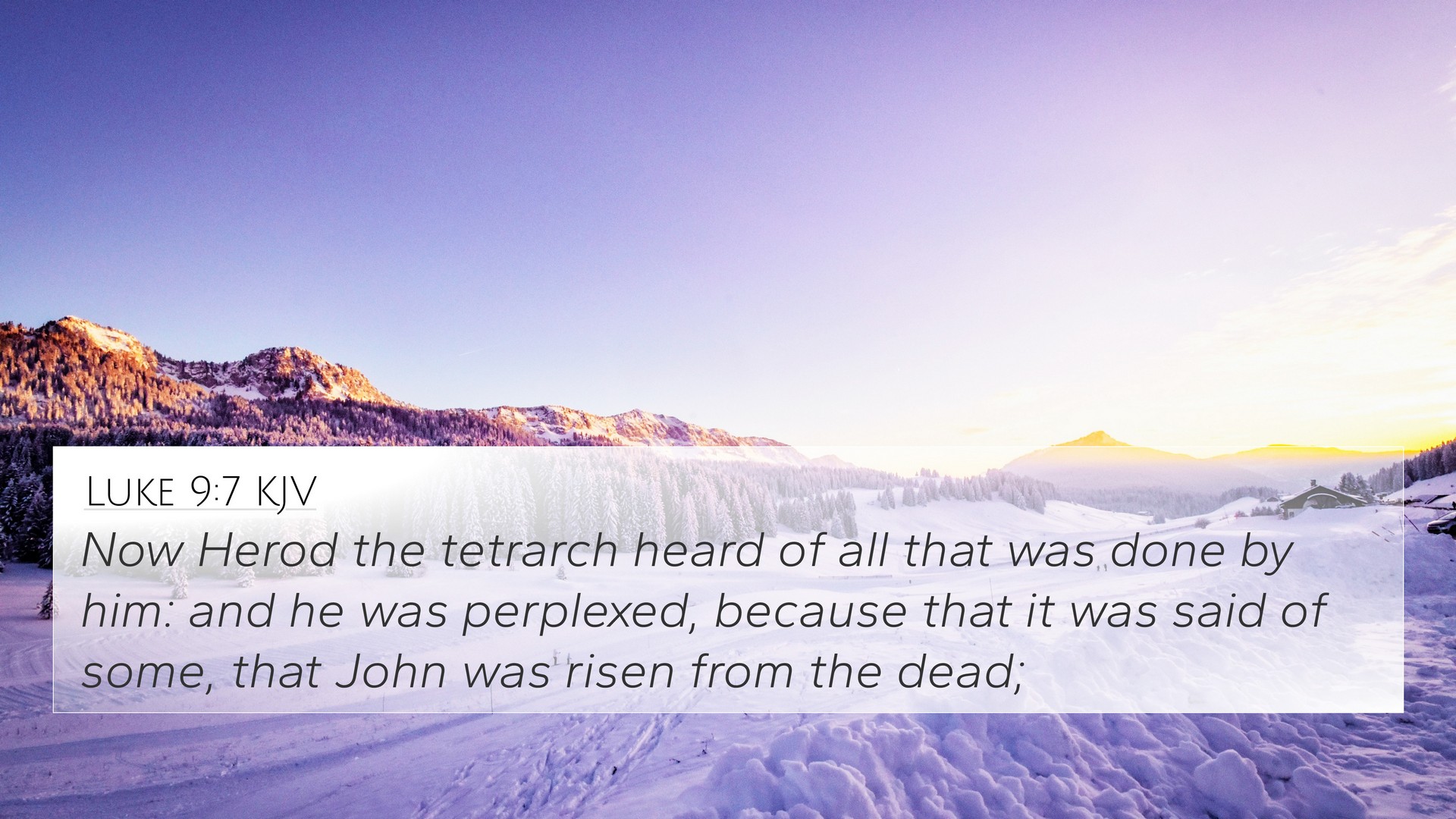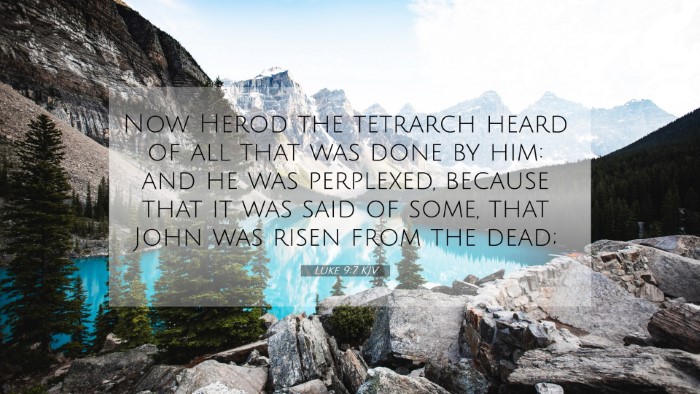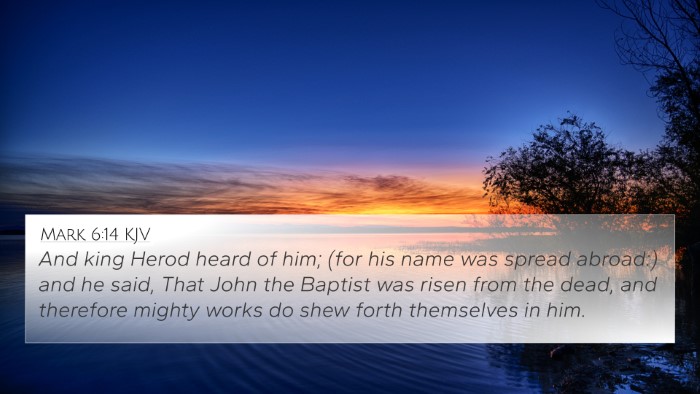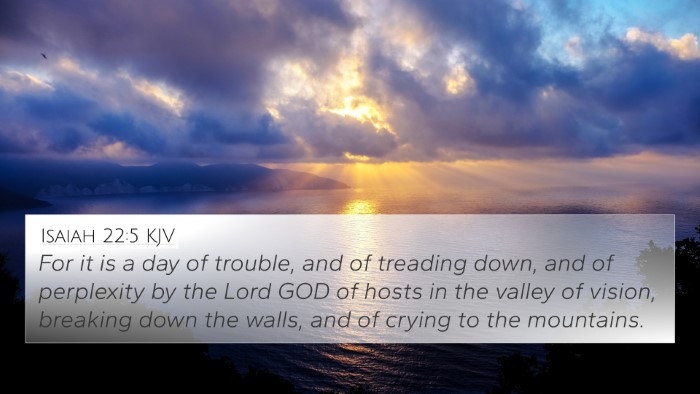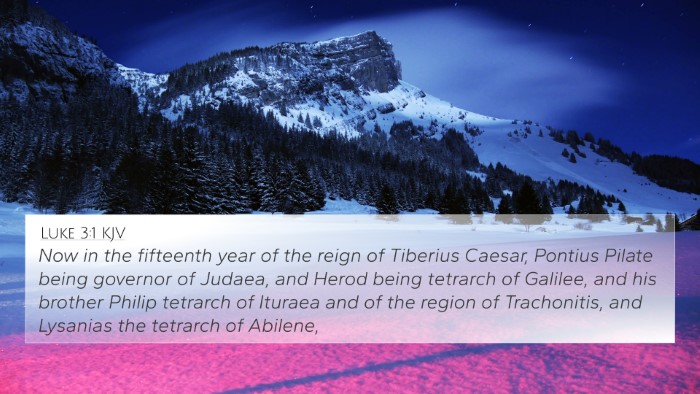Understanding Luke 9:7
Luke 9:7 states: "Now Herod the tetrarch heard of all that was done by him: and he was perplexed, because that it was said of some, that John was risen from the dead;" This verse highlights the mixed reactions to Jesus’ ministry and the confusion surrounding his identity.
Context and Background
This passage is set within a chapter where Jesus sends out his disciples to preach the gospel and perform miracles. It is crucial to understand Herod's role in the narrative, as his uncertainty reflects the broader societal confusion regarding Jesus' authority and the missional impact of the apostles.
Commentary Insights
-
Matthew Henry's Commentary:
Henry notes that Herod's perplexity highlights his internal conflict and fear of losing power, especially because of the prophetic figures like John the Baptist. Henry refers to this confusion as a result of Herod’s guilty conscience over the execution of John.
-
Albert Barnes' Commentary:
Barnes emphasizes the irony in Herod’s fear and confusion. Rather than acknowledging Jesus as the Messiah, Herod entertains the idea that John the Baptist has returned, showcasing a lack of understanding of who Jesus truly is.
-
Adam Clarke's Commentary:
Clarke discusses Herod's role as a ruler and his apprehension towards these miraculous events. He argues that Herod is portrayed as being troubled, a reflection of the convicting nature of Jesus' works that challenges civil authority and personal sin.
Connections with Other Scriptures
Luke 9:7 can be connected with various other Bible verses that reflect themes of confusion, identity, and prophetic fulfillment. Below are key cross-references:
- Matthew 14:1-2: This passage recounts Herod's reaction upon hearing about Jesus, showing the connection between John's legacy and Jesus’ impact.
- Mark 6:14-16: Similar to Luke 9:7, this passage demonstrates Herod's confusion, reaffirming the connection between Jesus and John the Baptist.
- Luke 9:19: Later in the chapter, the disciples also express a similar confusion about Jesus’ identity when asked, "Who do the crowds say that I am?"
- John 1:21: In this verse, John the Baptist's identity is questioned, highlighting how biblical figures often grapple with their roles and ministries.
- Acts 13:25: Refers back to John the Baptist and parallels are drawn between him and Jesus, emphasizing the prophetic lineage.
- Matthew 11:11-14: Jesus speaks of John’s role, providing context and understanding of John in relation to messianic prophecy.
- Luke 3:19-20: Discusses John's imprisonment by Herod, giving clarity to Herod’s confusion and fear regarding the prophetic voice he silenced.
Thematic Connections
Luke 9:7 embodies the tension between worldly authorities and divine authority. This theme runs throughout the Gospels and can be summarized in several key points:
- Authority vs. Power: Herod represents human authority that is afraid of divine power and the implications it brings.
- Perception and Reality: The confusion over Jesus' identity illustrates how people often misinterpret spiritual truths based on their own biases and experiences.
- Prophetic Voices: The connection between Jesus and John emphasizes that God's messengers often face opposition from those in power.
Practical Applications
Understanding Luke 9:7 encourages believers to consider their responses to Jesus' ministry and the confusion that can arise about truth in our society:
- Seek clarity about Jesus' identity through prayer and scripture study.
- Recognize the importance of prophetic voices in our lives that call us to truth.
- Understand the implications of God's authority over worldly powers, especially in times of uncertainty.
Conclusion
Luke 9:7 encapsulates a moment of intrigue that invites deeper exploration into the nature of Christ and the reactions of those in authority. The conflicting responses challenge readers to reflect on their understanding of faith and how they interpret the actions of God in the world.
Utilizing Bible Cross-Referencing Tools
For further study, various tools for Bible cross-referencing can enhance understanding:
- Bible Concordance: A valuable resource for finding themes and connections between scriptures.
- Bible Reference Resources: Guides that assist in locating related verses and themes.
- Cross-Reference Bible Study Methods: Effective techniques for comparing scriptures across the Old and New Testament.
- Bible Chain References: Helps in following thematic threads throughout the text.
In summary, Luke 9:7 not only conveys Herod's confusion but also acts as a catalyst for exploring the complex relationships between biblical figures, their messages, and the overarching themes of divine authority versus human authority.
